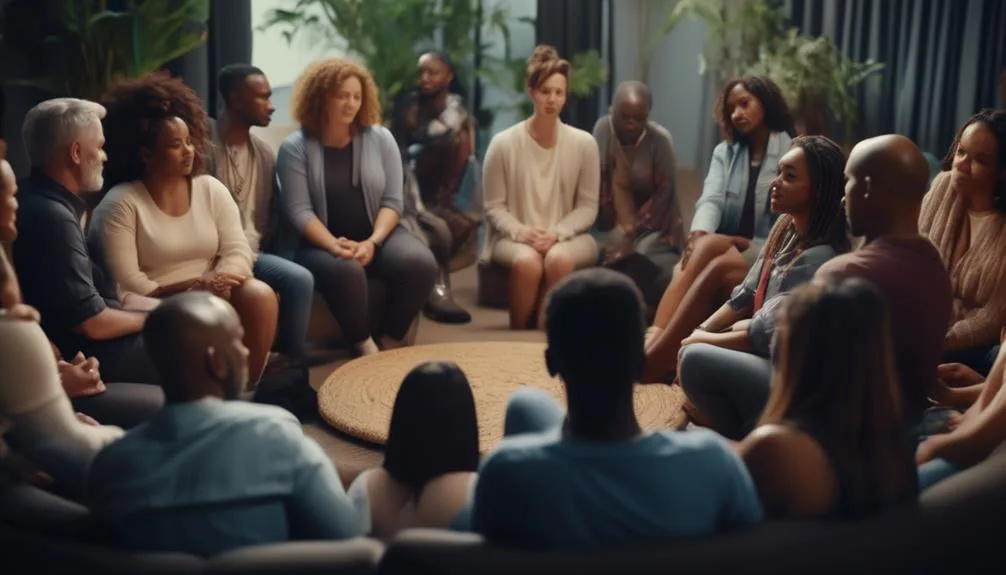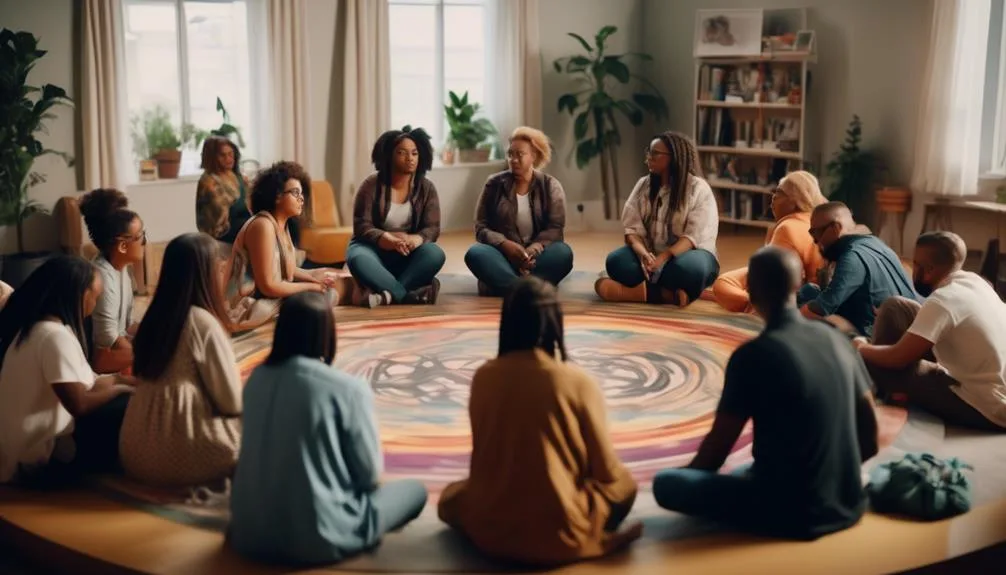Are you ready to unlock the key that opens the door to a more fulfilling and empowered life? Group therapy holds the answer.
In this discussion, we will explore the transformative power of group therapy, revealing the numerous benefits it offers and the unique experiences that await you.
From building connections to gaining new perspectives, this therapeutic approach has the potential to revolutionize your journey towards growth and healing.
So, are you ready to discover the untapped power within you?
Key Takeaways
- Group therapy is a form of psychotherapy that involves multiple therapists and individuals, providing a supportive and accepting environment.
- There are various types of therapy groups, including psychoeducational groups, self-help groups, and interpersonal therapy groups, each serving different purposes.
- Group therapy offers numerous benefits, such as a sense of belonging, learning from others' experiences, and being more cost-effective compared to individual therapy.
- Guidelines for group therapy include establishing confidentiality, encouraging active participation, setting clear goals, fostering a non-judgmental atmosphere, and providing structure and guidance during sessions.
Benefits of Group Therapy
Group therapy offers a multitude of benefits that can greatly enhance your mental health and overall well-being.
One of the key benefits is the opportunity to build a strong support network. In group therapy, you're surrounded by individuals who are going through similar challenges, providing a sense of belonging and acceptance. This support network can offer encouragement, understanding, and empathy, which can be incredibly helpful in your journey towards healing.
Additionally, group therapy promotes personal growth. By sharing your experiences and listening to others, you gain new insights and perspectives. This can lead to self-reflection, increased self-awareness, and the development of new coping skills.
The group dynamic fosters interpersonal learning and encourages you to explore different aspects of yourself, ultimately contributing to your personal growth.
Guidelines for Successful Group Therapy

To ensure a successful group therapy experience, it's essential to establish clear guidelines and rules that create a safe and supportive environment for all participants.
These guidelines are crucial in establishing trust and promoting effective communication within the group. By setting clear expectations, participants can feel secure in sharing their thoughts and emotions, knowing that their privacy will be respected.
Encouraging active participation and respecting diverse perspectives fosters an atmosphere of mutual understanding and empathy. Providing structure and guidance during sessions helps maintain focus and progress towards the group's goals.
A non-judgmental environment encourages open expression, allowing individuals to explore their emotions and experiences. By adhering to these guidelines, group therapy can become a powerful tool for personal growth and healing.
Diversity in Group Therapy

Embracing diversity in group therapy allows for a rich and dynamic environment where individuals can gain a deeper understanding of different perspectives and experiences. By fostering inclusivity and enhancing empathy, group therapy becomes a space where people from various backgrounds can come together to share their stories, challenges, and triumphs. This not only promotes a sense of belonging and acceptance, but also encourages personal growth and learning. To illustrate the power of diversity in group therapy, consider the following table:
| Benefits of Diversity in Group Therapy | |
|---|---|
| Increased understanding of experiences | Fostering inclusivity |
| Broadened perspectives | Enhancing empathy |
| Greater awareness of social issues | Encouraging growth |
In a diverse group, individuals have the opportunity to learn from others' unique journeys and gain insights that they may not have encountered otherwise. This diversity promotes empathy, as it challenges preconceived notions and encourages open-mindedness. Ultimately, embracing diversity in group therapy creates a supportive and inclusive space where individuals can thrive.
Common Discussion Topics in Group Therapy

As the group therapy session continues, it's important to explore common discussion topics that can provide a platform for individuals to share their experiences, gain support, and learn from one another.
Relationships and coping skills are two crucial topics that often arise in group therapy sessions. Relationships can encompass various aspects, such as romantic relationships, family dynamics, friendships, and work relationships. Group members can discuss challenges they face in their relationships, share strategies for effective communication, and explore ways to build healthier connections.
Coping skills, on the other hand, focus on how individuals manage stress, anxiety, and other emotional difficulties. Group therapy offers a space for members to exchange coping strategies, learn new techniques, and receive validation and encouragement from their peers.
Engaging Activities for Group Therapy

Engaging activities in group therapy can foster connection, promote personal growth, and enhance the therapeutic experience for all participants.
Here are some examples of activities that can be incorporated into group therapy sessions:
- Art Therapy: Engage in creative expression through painting, drawing, or collage-making, allowing individuals to explore their emotions and experiences visually.
- Role Playing: Act out scenarios or take on different roles to practice social skills, problem-solving, and communication techniques in a safe and supportive environment.
- Guided Imagery: Use visualization exercises to stimulate imagination, relaxation, and self-reflection, helping individuals tap into their inner resources and explore their inner world.
- Group Games: Play interactive games that encourage teamwork, cooperation, and trust-building, fostering a sense of camaraderie and connection within the group.
- Journaling: Encourage individuals to write in a personal journal during or outside of therapy sessions, promoting self-reflection, self-awareness, and emotional processing.
These activities provide opportunities for self-expression, learning, and growth, while also promoting a sense of belonging and support within the group therapy setting.
Frequently Asked Questions
How Can Group Therapy Help Individuals With Specific Mental Health Disorders, Such as Bipolar Disorder or Borderline Personality Disorder?
Group therapy can benefit individuals with mental health disorders like bipolar disorder or borderline personality disorder. It provides a sense of belonging, a support network, and learning from others' experiences. It can be effective in managing symptoms and promoting personal growth.
What Are Some Potential Challenges or Drawbacks of Participating in Group Therapy?
Participating in group therapy can present challenges and drawbacks. It may feel intimidating to share personal experiences with strangers, and conflicts among group members can arise. However, these challenges can be opportunities for growth and learning.
Group therapy can be beneficial for individuals hesitant to share personal experiences or emotions. It provides a supportive environment where you can overcome hesitations and learn from others' experiences, leading to personal growth and a sense of belonging.
How Can Group Therapy Be Beneficial for Individuals Who Have Experienced Trauma or Are Dealing With Ptsd?
How can group therapy benefit individuals who have experienced trauma or are dealing with PTSD? Find support, understanding, and validation from others who share similar experiences. Learn coping strategies, gain insights, and build resilience through the power of collective healing.
Are There Any Specific Guidelines or Considerations for Facilitating Group Therapy Sessions for Children or Adolescents?
When facilitating group therapy sessions for children and adolescents, it's important to follow specific guidelines and considerations. This helps ensure the effectiveness and benefits of group therapy for young individuals, promoting their growth and well-being.
Conclusion
As you reach the end of this article, imagine yourself stepping into a room filled with warmth and understanding, surrounded by individuals who are on their own healing journey.
Group therapy holds the key to unlocking the power within you, providing a space for growth, connection, and support.
Through active participation and the guidance of skilled therapists, you can navigate the complexities of life and emerge stronger than ever.
Embrace the transformative potential of group therapy and embark on a path towards healing and personal growth today.

